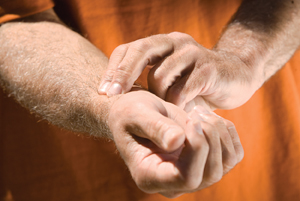Exercise: Measuring Your Pace
Getting your heart to work at the right pace is important. It means you’ll develop better aerobic endurance. This happens because your heart gets stronger and more efficient from the challenge. A stronger heart can pump more oxygen to your muscles. Then you don’t get tired as quickly when doing hobbies, sports, or daily activities.
How does it feel?
Listening to your body is the best way to decide if an exercise pace is right for you. If you do too much, you’ll get tired too quickly or get hurt. If you do too little, you won’t get the health rewards you want.
During or after exercise, you should not feel sick, dizzy, or extremely tired. After you’re done, you should feel normal again in about 10 minutes. If you’re very tired or very sore the next day, you may have exercised too hard.
Your target heart rate
When you exercise, you should keep your heart rate within a safe range. This is called your target heart rate range. Your heart rate is measured by taking your pulse. If you don’t know how to take your pulse, ask your health care provider to show you how. Take your pulse often as you exercise. This helps to make sure you’re within your target heart rate range. When you exercise at the right heart rate, you will get the most out of your exercise safely.

Finding your target heart rate
Your average target heart rate is based on a person's age and health.
It's important to ask your provider how much exercise is safe for you. If you’re healthy, you can use the chart to find the average target heart rate range of people in your age category. If your heart rate goes too high, slow down until you’re back in your range.
|
Age (Years)
|
Target heart rate zone, 50% to 85%
|
Average heart rate, maximum (don't go above)
|
|
20
|
100-170
|
200
|
|
35
|
93-157
|
185
|
|
40
|
90-153
|
180
|
|
45
|
88-149
|
175
|
|
50
|
85-145
|
170
|
|
55
|
83-140
|
165
|
|
60
|
80-136
|
160
|
|
65
|
78-132
|
155
|
|
70
|
75-128
|
150
|
Online Medical Reviewer:
Elizabeth Oswald PT DPT
Online Medical Reviewer:
Stacey Wojcik MBA BSN RN
Online Medical Reviewer:
Vinita Wadhawan Researcher
Date Last Reviewed:
3/1/2025
© 2000-2025 The StayWell Company, LLC. All rights reserved. This information is not intended as a substitute for professional medical care. Always follow your healthcare professional's instructions.